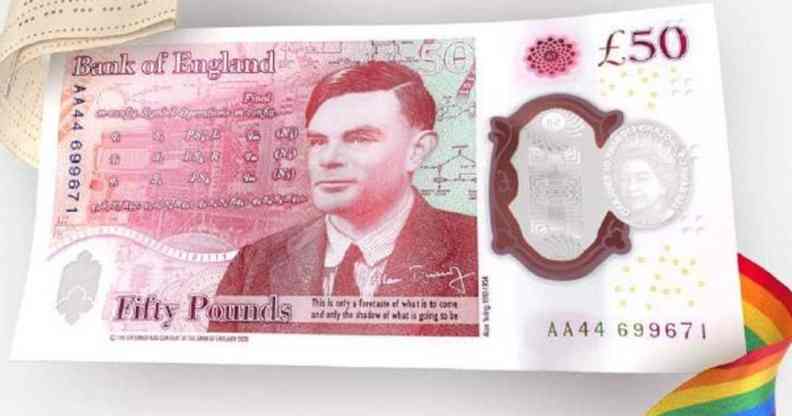New £50 note celebrating gay war hero Alan Turing unveiled by Bank of England

The new £50 banknote has been unveiled, featuring codebreaker and mathematician Alan Turing. (Bank of England)
The new £50 note featuring Alan Turing, codebreaker, computing pioneer and gay hero, has been unveiled by the Bank of England.
The Alan Turing £50 note features a photo of the mathematician taken in 1951 by Elliott and Fry, which is part of the National Portrait Gallery’s collection. It also has a quote from Turing, given in an interview with The Times in 1949: “This is only a foretaste of what is to come, and only the shadow of what is going to be.”
It will enter circulation on 23 June, which would have been Alan Turing’s birthday. The note features a ticker-tape depicting the mathematician’s birthdate (23 June 1942) in binary code. The concept of a machine fed by binary tape was featured in Turing’s 1936 paper “On Computable Numbers, with an application to the Entscheidungsproblem” – a foundational text for modern computer science.
Andrew Bailey, governor of the Bank of England, told Sky News that as well as honouring Turing for his codebreaking work, which helped end the Second World War, the new £50 note celebrates his efforts in advancing mathematics, pioneering modern computing and his identity as a gay man.
“He was a leading mathematician, developmental biologist and a pioneer in the field of computer science,” Bailey explained. “He was also gay and was treated appallingly as a result.”
By putting Turing on the note, Bailey said: “We are celebrating his achievements and the values he symbolises.”
The new Alan Turing £50 note will be the last of the Bank of England’s collection to switch from paper to polymer. But, as with the old notes, the paper £50 will still be accepted in shops for some time to come.
He now replaced the steam engine pioneers James Watt and Matthew Boulton who are on the current £50 note, issued in 2011.
The new banknote was welcomed by many LGBT+ public figures, including MP Luke Pollard.
As a gay kid growing up there weren’t many role models in the public eye. This is why visibility matters. I’m not sure how many people will actually see a £50 note but knowing Alan Turing is on it helps, in a small way, right a wrong and provides welcome #lgbt visibility. pic.twitter.com/cZVxXYS5vu
— Luke Pollard MP (@LukePollard) March 25, 2021
Though some, like aidsmap executive director Matthew Hodson, suggested that as well as the banknote, a conversion therapy ban would “truly honour” Turing.
Yes – the Alan Turing £50 note is wonderful.
Turing was chemically castrated for being gay and later committed suicide.
Truly honour him. #BanConversionTherapy. pic.twitter.com/zWlcrFU27j— Matthew Hodson (@Matthew_Hodson) March 25, 2021
Who was Alan Turing?
Alan Turing was born on 23 June, 1912 and was educated at Cambridge. He spent a few years studying for a PhD at Princeton University, but returned to Cambridge and joined the Government Code and Cypher School – a codebreaking group.
During the Second World War, Turing worked at the famous Bletchley Park where he cracked the Enigma code used by the German navy to transmit secret communications. As a result, Turing and his colleagues have been credited with speeding up the end of the Second World War.
After the war, Turing continued to work on computing innovation and artificial intelligence. In 1950, he proposed the “Turing test” to determine whether a computer was artificially intelligent – a test that remains important in the modern understanding of AI.
However, in 1952, Turing was convicted of “gross indecency” in 1952 when it was revealed that he had a relationship with another man, at a time when homosexuality was a crime in the UK. He was sentenced to 12 months of hormone “therapy” – a cruel and horrible chemical castration treatment to eliminate his libido and therefore any gay urges.
His conviction also meant that he could never work for the Government Communications Headquarters (GCHQ), the post-war successor to the Government Code and Cypher School.
On 7 June, 1954, Alan Turing died by suicide, and it wasn’t until 2009 that the government apologised for the treatment Turing received.
In 2014, he was granted a posthumous royal pardon, and in 2017, a law was passed in his name to allow thousands of men convicted of historical gay sex offences to apply for a formal pardon.

